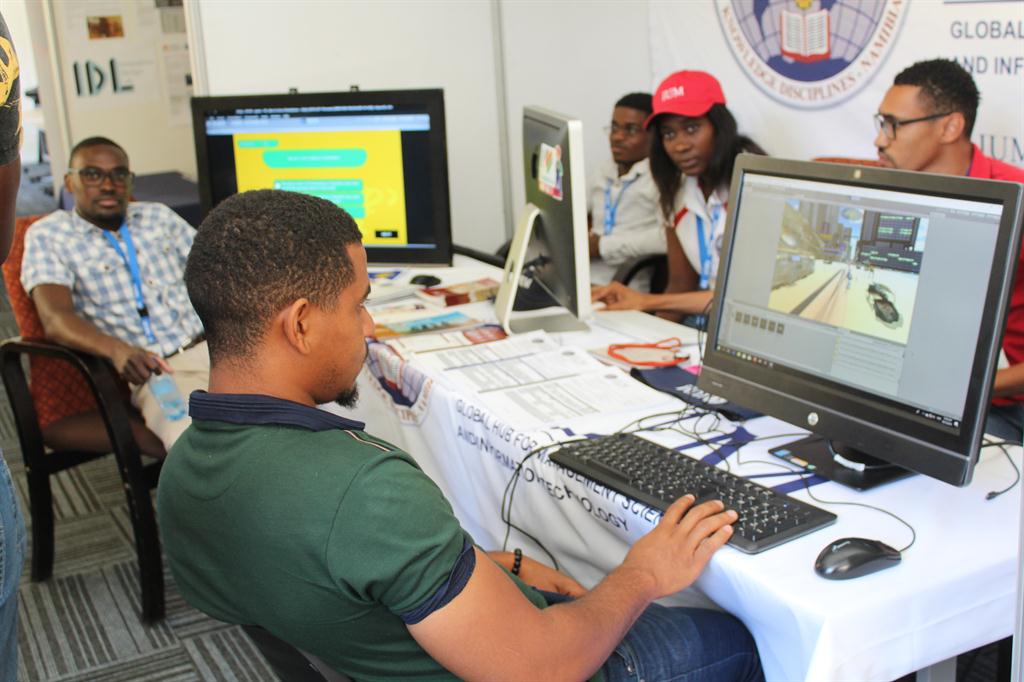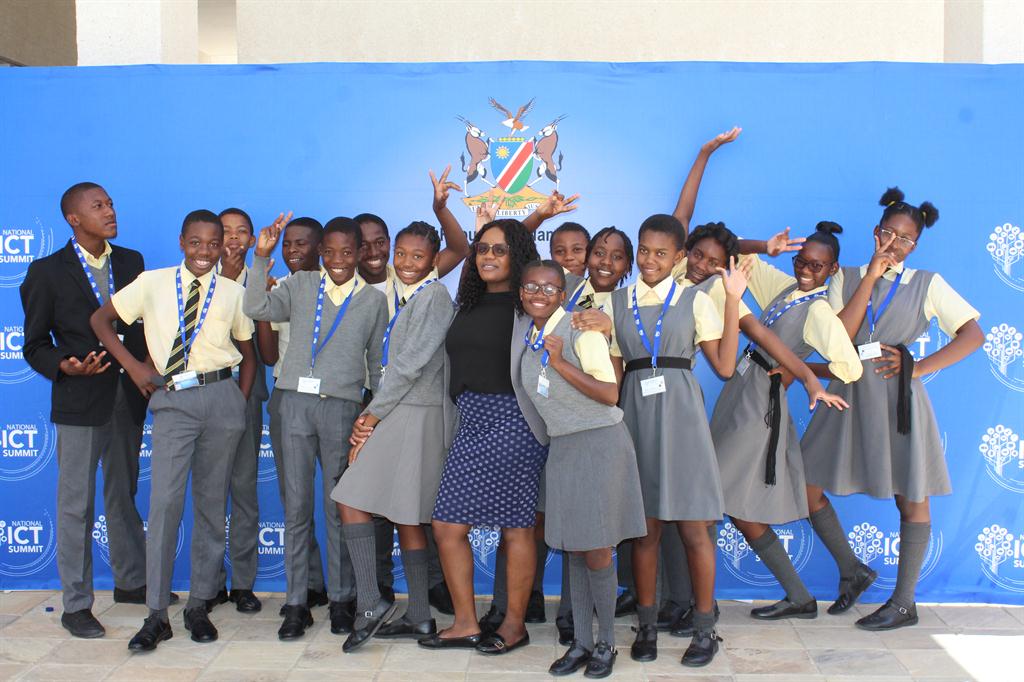Energising the future
The National ICT Summit creates platforms for the ICT industry to discuss trends and challenges facing the industry globally and in the country.
JUSTICIA SHIPENA
The ministry of information and communication technology hosted the 6th National ICT Summit under the theme ‘Accelerating Digital Transformation in Namibia’ in Windhoek from 7 to 9 October.
The summit presented unique opportunities for interaction between policymakers, ICT experts, academics, entrepreneurs and ICTs innovators to reflect, understand and share knowledge on advancements and trends in the ICT sector.
The youth day focused on discussions of matters related to youth tech entrepreneurship, innovation and the many challenges and opportunities young Namibians are facing towards the journey of digital transformation.
Speaking at the summit, Engelberth Nawatiseb, deputy minister of information and communication technology, said digital transformation is the application of ICT concepts and tools to all aspects of our lives. It will impact everything from government, to business, education, healthcare, employment and how individuals live their daily lives.
“It is for this reason that at the ICT Summit of last year the ministry announced that it would set in motion the process of developing a National Digital Strategy in partnership its stakeholders,” he said.
He added that the National Digital Strategy is intended to provide a comprehensive road map that will guide the country's digitisation agenda and help us to answer some of the complex questions.
“The process of developing this strategy has been started and it is at an advanced stage. The Namibian youth are an important key stakeholder in the development of the digital strategy and their concerns and inspirations should be discussed and captured in order to be reflected in the strategy.”
Nawatiseb called on business institutions and delegates to encourage innovation by supporting and investing in the innovative concepts that were showcased.
Dr Stanley Shanapinda, motivational speaker, spoke on ‘The Harm of Digital Technologies to Young People and Their Identity Deficit.’
Shanapinda said young Namibian ‘techno-preneurs’ would develop digital apps, such as social media and gaming applications, for fellow digital natives to use regularly so that the application is commercially viable. In this way the young ‘techno-preneur’ would make money from the application that he or she created.
He added that to minimise potential mental health risks associated with social media applications, we must ensure web apps are designed ethically and responsibly, to help with the responsible use of the application.
“I would like to call it ‘ethical-by-design’. This is a web application that is designed to consider the effects of mental health at the design stages, with the aim of minimising mental health effects.”
He plead to upcoming ‘techno-preneurs’ to consider the responsible development of technology, so as not to manipulate fellow young people to become addicted to their products, but to encourage the responsible use of technology.
Shanapinda further said they should think about how that product can uplift the mood and spirit of its users rather than making them anxious and depressed. Social media digital transformation must be done responsibly and ethically, and not to manipulate people for likes, to promote and sell products and just to make money.
Anna Nangolo, a learner at Caprivi Secondary Senior School, who did a pitch at the sixth ICT Summit, said they created a school YouTube channel where fellow learners can edit and upload their own video clips.
“In these videos we have discussions on social problems that affect the education sector in Namibia and SADC,” she said.
Nangolo said the country is developing and ways of tackling these problems are very outdated. That is why they chose to use the world's second most frequently used social media platform for this innovation. In the future this YouTube channel could create income for the school.
She concluded by saying the summit was an eye-opening experience, where she learned that ICT plays a major role in the development of the country.
“We as the youth should take opportunities such as the national ICT Summit and use it as a platform to showcase the innovative ideas we have so that they can be heard and put into practice,” Nangolo said.
The ministry of information and communication technology hosted the 6th National ICT Summit under the theme ‘Accelerating Digital Transformation in Namibia’ in Windhoek from 7 to 9 October.
The summit presented unique opportunities for interaction between policymakers, ICT experts, academics, entrepreneurs and ICTs innovators to reflect, understand and share knowledge on advancements and trends in the ICT sector.
The youth day focused on discussions of matters related to youth tech entrepreneurship, innovation and the many challenges and opportunities young Namibians are facing towards the journey of digital transformation.
Speaking at the summit, Engelberth Nawatiseb, deputy minister of information and communication technology, said digital transformation is the application of ICT concepts and tools to all aspects of our lives. It will impact everything from government, to business, education, healthcare, employment and how individuals live their daily lives.
“It is for this reason that at the ICT Summit of last year the ministry announced that it would set in motion the process of developing a National Digital Strategy in partnership its stakeholders,” he said.
He added that the National Digital Strategy is intended to provide a comprehensive road map that will guide the country's digitisation agenda and help us to answer some of the complex questions.
“The process of developing this strategy has been started and it is at an advanced stage. The Namibian youth are an important key stakeholder in the development of the digital strategy and their concerns and inspirations should be discussed and captured in order to be reflected in the strategy.”
Nawatiseb called on business institutions and delegates to encourage innovation by supporting and investing in the innovative concepts that were showcased.
Dr Stanley Shanapinda, motivational speaker, spoke on ‘The Harm of Digital Technologies to Young People and Their Identity Deficit.’
Shanapinda said young Namibian ‘techno-preneurs’ would develop digital apps, such as social media and gaming applications, for fellow digital natives to use regularly so that the application is commercially viable. In this way the young ‘techno-preneur’ would make money from the application that he or she created.
He added that to minimise potential mental health risks associated with social media applications, we must ensure web apps are designed ethically and responsibly, to help with the responsible use of the application.
“I would like to call it ‘ethical-by-design’. This is a web application that is designed to consider the effects of mental health at the design stages, with the aim of minimising mental health effects.”
He plead to upcoming ‘techno-preneurs’ to consider the responsible development of technology, so as not to manipulate fellow young people to become addicted to their products, but to encourage the responsible use of technology.
Shanapinda further said they should think about how that product can uplift the mood and spirit of its users rather than making them anxious and depressed. Social media digital transformation must be done responsibly and ethically, and not to manipulate people for likes, to promote and sell products and just to make money.
Anna Nangolo, a learner at Caprivi Secondary Senior School, who did a pitch at the sixth ICT Summit, said they created a school YouTube channel where fellow learners can edit and upload their own video clips.
“In these videos we have discussions on social problems that affect the education sector in Namibia and SADC,” she said.
Nangolo said the country is developing and ways of tackling these problems are very outdated. That is why they chose to use the world's second most frequently used social media platform for this innovation. In the future this YouTube channel could create income for the school.
She concluded by saying the summit was an eye-opening experience, where she learned that ICT plays a major role in the development of the country.
“We as the youth should take opportunities such as the national ICT Summit and use it as a platform to showcase the innovative ideas we have so that they can be heard and put into practice,” Nangolo said.













Comments
Namibian Sun
No comments have been left on this article